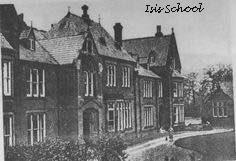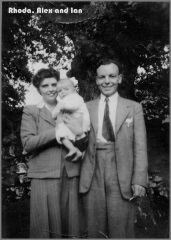Unlike Culcheth Primary School, the bad reputation of my brother, Alistair, did not put me at a disadvantage when I started at the Isis School. In fact, the opposite was the case, because my eldest brother Sandy had attended the school before me. He had been one of the most popular boys at the school. So, his good reputation preceded me. Most of the teachers were delighted to meet another Harkness!
Sandy’s Trajectory
Sandy had first attended Culcheth Secondary Modern, but my parents decided that the school wasn’t giving their son a proper education. They had no plan for him to be a steelworker at Irlam Steelworks, as they had better ambitions for him. In fact, to cut a long story short, he continued on to university and ended up in a high-paying position working for the National Coal Board.
He eventually moved with his family to the U.S. at a time when the ‘American Dream’ was still alive and well. He and his family thrived in the U.S., so he also managed to thwart the British government’s plan during the post-war period of throwing the majority of British children into educational ‘dustbins’, that is, the Secondary Moderns.
However, the fact that Sandy and I were sent to a private fee-paying school was another slap in the face for my brother Alistair. It was bad enough that he had been subjected to the machinations of a horrible teacher at the primary school, he was now stigmatised twice over as the only one out of five sons that didn’t receive a grammar school or private school education. In his mind, it was as if Mrs. Bonse was in cahoots with his mother to make sure he became a ‘working class’ robot.
Alistair’s Life
Growing up in a middle class family, Alistair was the only one that was ‘working class’, and, in fact, over the years, he started to behave and talk, as if he actually was from the working class, no doubt to annoy our mother who derided the working class.
Amongst this behaviour was his interest in horse racing. Ironically, horse racing, like sham patriotism, illustrates one of the great curiosities of English social life: how so many social patterns are U-shaped — popular with the toffs at the top and the plebs at the bottom, with not much interest in between.286 That is, horse racing was popular with the working class and the upper class, but not so much the middle class (at least in the post-war period). Not least, Queen Elizabeth owns many racing horses.287 Although she is now 96 years old, the horses still make her smile.
On the day of the Grand National (in the spring) my mother would make a lottery of the horses. We, sons, would all receive bits of paper with the names of the various horses. This was highly exciting! We would listen to the race on our Ferguson radiogramme (more exciting than the TV), while living at 26 Hob Hey Lane in Culcheth, Lancashire. These ‘Grand National’ days listening to the radiogramme, and making bets, achieved some kind of family togetherness (in which Alistair felt included – as he was not always ‘included’). This hardly explains my brother’s obsession with horse betting, but perhaps a Freudian could explain it.
Fri 13 May 2022 14.45 BST
Monarch, 96, was at the Royal Windsor show to watch her mare Balmoral Leia announced as supreme champion.288
The Queen was all smiles when her horse was named supreme champion after she made a rare public appearance and joined crowds at an equestrian show.
Looking relaxed and laughing, the head of state sat in a vehicle and watched entrants in the parade ring as she chatted to officials from the Royal Windsor horse show and members of her staff through the open passenger window.
The ‘Talk’
Before starting at the Isis School, one day my mother told me when I came back from playing outside with Billy, that my father wanted to ‘talk’ to me. This was pretty scary because my father never ‘talked’ to any of his sons, except to tell them to do something. I remember the room for the ‘talk’ was the kitchen.
“Sit doon thare,”294 he said, pointing to one of the kitchen chairs. He sat in a chair opposite, leaning his ruddy face close to mine, so I could smell the reek of his pipe-smoking breath.
The school fees were not very expensive, although for my parents, they probably were. As mentioned, my father worked as an electrical engineer and draughtsman at the Atomic Energy, Risley, near Culcheth. He was reasonably well paid, but having five children, a mortgage, and a car, meant that he wouldn’t have that much of his salary left to send his children to fee-paying schools. In other words, it was probably my mother that wanted me to go to a private school, whereas my father probably thought it was an unnecessary expense.
Effect of Words
“Ye ken we hae gaen tae a lot o’ trouble tae git ye intae this schuil, ‘n’ we expect ye tae wirk solid! Ah expect ye to wirk lik’ a nigger!”295
That was the end of the ‘talk’. But the use of the word ‘nigger’ made a lasting impression on me. He actually scared me into working hard! But I was only a 12-year old boy, and boys don’t remain ‘scared’ for long. I think I was seriously working hard for the first six weeks (‘like a nigger’), but I eventually forgot about his ‘nigger’ talk, and reverted to my normal mode of boy-having-fun, only working if I felt like it, or if I was doing something I liked.
To be honest – I was only 12-years old, and didn’t even know what a ‘nigger’ was. I just understood it was something negative. Of course, the irony here is that if I had carried on working hard I may have become the most successful ‘nigger’ in the history of England.
School Building Architecture
I attended the Isis School from 1961 to 1963 when I was 12 and 13 years old in the first and second forms. It was a large Victorian Gothic building of three storeys designed by the architect J. J. Bradshaw. It was located in Mawdsley Street, Sharples, Bolton, Lancashire. Since it wasn’t located in the centre of Bolton, it meant I had to take three buses to get to school; one bus from Culcheth to Leigh, number 26; a bus from Leigh to Bolton; and then another bus to Sharples.
This ‘Victorian’ school was well-built in contrast to the ‘modern’ jerry-built glass and concrete state schools erected in the post-war period, such as Culcheth Primary School. Perhaps this can be explained by the fact that the ample and opulent Gothic building was financed by private capital rather than state capital.
Eden’s Orphanage
The building used to be Eden’s Orphanage, something I wasn’t aware of when I was a pupil at the school. Eden’s Orphanage was a gift of James Eden when he died in April 1874. A total sum of £50,000 was donated for the building of a home for the care and support of Bolton’s destitute orphans. This was obviously a vast sum of money at the time, and allowed the building of quite an impressive edifice (£10, 000 used for the actual building of the home).
The building was taken over by the Isis School in 1951. However, as you can see from the various photos included here, Eden’s Orphanage had a central tower or turret that must have been demolished at some time, because the Isis School had no such tower.
What is left of the school today seems almost unrecognizable.296 This is interesting in relation to the feeling many people no doubt have when they reach a certain age – that their lives in the past are ‘just a dream’ and never happened. However, that is one of the aims of these ‘Recollections’ to show that ‘these things did actually happen’, although they have been dissipated in the mists of time.
It might be surmised that the establishing and building of private schools flourished during the post-war period due to weak-willed governments that were unable to provide adequate education for everybody, but only for a privileged minority, as described above. However, I haven’t researched this statistically. Of course, it is also ironic that Victorian governments were wholly unable to help the poor and destitute as documented in the novels of Charles Dickens, and as is evident by the fact that provision for orphans often depended on the funding of charitable capitalists, as was the case with Eden’s Orphanage.
Inside the Isis School
The Isis School was a fairly small private school – perhaps around 500 pupils. It was modelled on fee-paying Public schools in England. The schools often emphasised the importance of ‘character-building’, of which games and sports were viewed as an important element.
It had two wings, and was more or less symmetrical in shape. It also had adequate playgrounds (where we played football), wash houses, and a small swimming pool (which was refurbished during my stay there). The school and its grounds were not fenced in but surrounded partly by copses.
The ground fell away steeply behind the playground to Astley Brook, and was a wooded area deemed ‘out-of-bounds’. However, there was an area some way beyond the playground that was levelled out and covered in grass. We used that for games such as the annual competition among the three school houses, Lancaster, York and Windsor.
The school also had a large hall which was used for school dinners and ‘communal’ events, and of course kitchens. There were nine classrooms, and ancillary buildings used as a kindergarten and a residential school for younger children.
My classroom was on the top floor of the wing in the right of the photo. The classroom had a high ceiling and large windows. If you turned left out of the classroom door and walked down a couple of steps, you’d arrive at Mr. Weaver’s poorly-lit classroom which had a low ceiling under the roof.
My Best Teacher
Mr. Weaver was the geography teacher. He took an immediate liking to me because he had taught my ‘popular’ brother Sandy before me. He was in his late twenties or early thirties, of medium build, and had a Hitler-like fringe. His face seemed to be fixed into a ‘wild’ expression although this seemed to contradict his behaviour, as he was quite an amiable teacher.
My elder brother Sandy told me that Mr. Weaver also had his own private business making a soft drink called ‘Dandelion and Burdock’, which was popular at the time. I remember Sandy was inspired by this idea and also tried to make ‘Dandelion and Burdock’ at our house in Hob Hey Lane by collecting dandelions!
This wasn’t quite successful; but he had more success growing mushrooms on a compost heap in the back garden. He sold the mushrooms to neighbours, as mushrooms were quite expensive. You could buy a home-growing mushroom kit through mail order at that time. My mother often encouraged this entrepreneurial spirit amongst her children, which perhaps reflected the ‘spirit’ of the times.
Sources
286 Edited and adapted from: https://unherd.com/2021/07/class-war-will-never-happen/ Read 23 March 2022.
287 As of 2013, horses owned by the Queen have won over 1,600 races, and excluding the Epsom Derby has won all the British Classic Races, some multiple times. She has also won a French Classic, the Prix de Diane in 1974. https://en.wikipedia.org/wiki/Horses_of_Elizabeth_II Read: 13 May 2022.
288 https://www.theguardian.com/uk-news/2022/may/13/queen-makes-public-appearance-at-royal-windsor-horse-show Read 14 May 2022.
294 Comment: My father grew up in Edinburgh, so he didn’t have such a broad accent as my mother who grew up in Glasgow. Perhaps readers are acquainted with the James Bond films. The first ‘James Bond’, Sean Connery, grew up in Edinburgh. In other words, his English did not divert much from so-called ‘standard English’. Nevertheless, my father, although he didn’t have a ‘broad’ Scottish dialect, often peppered his conversation with colourful ‘Scottish’ expressions – which I sadly have to admit I can’t recall an awful lot of. To make up for my incompetence here I will give him a ‘broad’ Scottish accent. I remember him often referring to ‘Harry Tate’ – which seems to be some kind of military slang.
295 “The phase ‘to work like a nigger’ was often used by slave owners as a backhanded compliment to someone who has pushed himself beyond human limits.” https://eng.ichacha.net/ee/work%20like%20a%20nigger.html Read: 14 May 2022. Nb. People often try to give words a fixed meaning, but this is a pointless endeavour, because meanings evolve and change depending upon the context. For example, in Black English vernacular, it remains common, and is not considered offensive. But in other present-day contexts, it is often considered offensive. However, the word has a long history – see Oxford Dictionary (1989): https://www.oed.com/oed2/00157994 Read: 14 May 2022. In other words, when my father used this phrase at the beginning of the 1960s, it was not considered especially offensive in certain contexts.
296 http://www.bolton.org.uk/edenhome.html Read 28 March 2022.




One Reply to “Attending the Isis School”